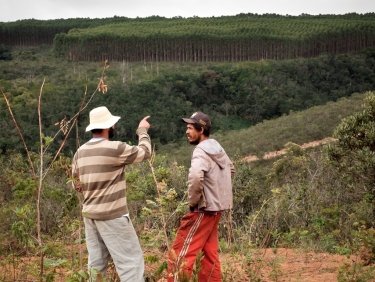Key Messages
The 2023 Land Forum aimed to gather diverse viewpoints on the land-based carbon market, which was reflected in the at times contrasting outlooks of the speakers. A central divide emerged among the keynote speakers, with some seeing the carbon market as a financial instrument with the potential to mobilize additional funds for communities in the Global South. In contrast, other speakers argued that the market functions as a colonialist tool, relieving the Global North of its climate crisis responsibilities and reinforcing the capitalist system, all while compromising land and human rights.
A recurring concern – and likely the most common ground among speakers – was the recognition of serious land and human rights risks and violations associated with carbon market projects, including a disregard for local culture, traditional land use and governance structures. Concrete examples of land and human rights violations were cited from different countries in Latin America and Africa, illustrating issues such as land grabbing. Alongside calls for improved safeguarding standards and for local communities to gain sovereignty in carbon projects, others deemed the market inherently unimprovable, entrenching unjust and colonial power structures.
The predominant focus on the CO2 metric within the market was criticized for contributing to misinformation and misstatements regarding carbon neutrality. In addition, it is seen as increasing the risk of so-called “false solutions” such as monoculture plantations, neglecting the importance of prioritizing biodiversity, food security and climate resilience — critical considerations, especially in the context of the multiple and interconnected crises we are facing. The invited experts suggested a move away from offsetting or carbon neutrality claims towards mere contribution claims, as well as a shift to alternative indicators emphasizing various ecosystem services and invested labour efforts.
The discussion expanded to explore ideas for systemic change, with some suggesting a fundamental rejection and departure from the current carbon market system due to its perceived continuation of colonial structures and ineffectiveness in addressing the climate crisis. Alternative solutions suggested involved reforms to the tax system, aiming to limit illicit financial flows to tax havens, and strengthening state climate funds to support indigenous communities in protecting their territories. The speakers further underscored the importance of local resistance in the Global South, where oppressed communities voiced their concerns, and the need for sound strategies to further advocate for these communities’ rights. Please find the full report of the HEKS/EPER Landforum as a PDF here.

